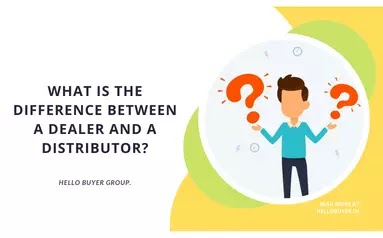What is the Difference Between a Dealer and a Distributor?
The things you purchase at your local supermart or online frequently go through a protracted chain of distribution from numerous sources. Delivering items through multiple channels, including dealers and distributors, is necessary to get them to the end location, like the supermarket in your neighborhood. The phrase "supply chain" refers to the extensive network of middlemen that connects the producer and the consumer. Dealers and distributors differ in a variety of ways, but the main distinction between them is the number of items each of them keeps on hand.
Who is a Distributor?
A distributor is a natural person, legal entity, or selling agent who contracts with a manufacturer to sell their goods on their behalf. They serve as a middleman throughout the entire supply chain process and have a direct line to the manufacturer. It's crucial to comprehend the distribution process before proceeding with the explanation.
What is Distribution?
Customers can purchase the goods and services of a specific business, brand, or manufacturer through a variety of channels. These could be physical storefronts like the supermarket mentioned above, telemarketers, numerous retailers, online e-commerce sites, or multiple retailers.
Numerous people and agents are involved throughout the entire process, all of whom work to make sure that the product is successfully delivered to or purchased by a customer. A distributor ensures that all products are distributed throughout the market.
He or she represents the manufacturer or brand entities in his or her dealings as an agent. Finally, they buy these goods from the producers and resell them to a variety of different customers, such as retailers and other participants in the supply chain.
Knowing that a distributor is typically chosen to operate by the manufacturing businesses themselves is helpful. This is a component of the marketing plan, which also grants these middlemen permission to act on their behalf in particular geographic regions. A distributor typically purchases goods and services in bulk before selling them to other companies and merchants.
A distributor is required by law to provide a variety of services, such as repair and replacement, technical support, and after-sales services, in addition to selling the commodities. A distributor may be permitted to sell only one brand of a product in an exclusive territory, or they may have many brands to sell in larger areas, depending on the distributor's authority and the brand in question.
Contract distributors are another type of distributor who purchases goods from manufacturers, combines them with other goods to raise the overall value, and then resell them. Consequently, a contract distributor differs from a wholesale distributor in that the latter only buys products, whereas a contract distributor combines them with goods from various producers.
Who is a Dealer?
A dealer is someone who actively buys products from producers to sell later as a component of their stock or account. A dealer is, to put it simply, a person who handles the trading of a specific good or commodity. He or she engages in personal trading for profit as a function of their enterprise.
Another definition of a dealer is a person who acts as a middleman between a distributor and a customer. They are permitted to sell these goods in their region just like distributors are.
A dealer can always draw customers who are loyal to other dealers or from another area, which distinguishes them from other middlemen. For instance, you may tell the dealer has been effective if you choose to go to the pizza chain outlet five blocks away rather than the one in your neighborhood.
A dealer may sell goods and products from competing brands, some of which will have stronger customer bases than others. By charging more for these than what he paid for them, he or she makes money.
Difference Between a Dealer and a Distributor.
Although a distributor and a dealer are both crucial components of the supply chain, there are a number of important distinctions between the two that can be summed up in the following ways.
- While a distributor is a person who supplies specific types of products to the market, a dealer negotiates deals with particular products.
- While a distributor acts as the intermediary between a dealer and a manufacturer, a dealer connects distributors with potential clients.
- A dealer purchases things from his or her own stock in the course of conducting regular business. In contrast, a distributor merely buys goods from producers and distributes them to merchants or retailers.
- Distributors typically only deal with one specific category of products, whereas dealers typically sell a wide range of goods as part of their business.
- Dealers compete fiercely with one another. Distributors hardly ever experience this.
How to Start a Distributorship business?
The dealers must choose the kinds of goods they want to buy and provide to customers before they can launch a business. They ought to get in touch with trustworthy distributors and providers. To properly create and expand their network, the dealers must invest in a suitable workspace. The dealers must use caution while creating the buying policy and should continually assess their success and dealership operations. Maintaining positive customer connections and earning their trust in their goods and services is crucial for dealers. Their dealership's business will expand over time.
If you want to find Top Brand Distributorship Opportunities as per your Budget, product category, and Area. You can do that we the help of Takedistributorship.com, India's best distributorship portal. Takedistributorship.com They Connect Distributor to the Right Brand. & Brand to the Right Distributor.






